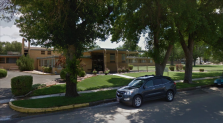Family sues Colorado nursing home over resident’s beating death

The family of a man who died after being beaten at an Otero County nursing home two years ago is suing the facility and its management, saying they could have prevented the attack.
Floyd Martinez, 82, died at Pioneer Health Care Center in Rocky Ford in May 2020, about two weeks after he was hospitalized following an attack by another resident. The suspect, who was charged with assault, died before going to trial.
A lawsuit filed in April said the facility was understaffed, and those conditions contributed to Martinez’s death. Almost all nursing homes have struggled with staffing since the beginning of the pandemic, but Pioneer Health Care Center wasn’t cited for inadequate staffing when inspectors investigated resident-on-resident violence.
The nursing home, however, has been cited repeatedly in recent years by state and federal agencies for safety violations.
In its lawsuit, Martinez’s family is seeking compensation for wrongful death and alleged violations of the Colorado Consumer Protection Act, arguing the nursing home misrepresented itself as safe.
Messages left at Pioneer Health Care Center seeking comment about the lawsuit weren’t returned.
Matthew Singleton Sr., 63, allegedly assaulted Martinez on the evening of April 16, 2020, after Martinez entered his room. Martinez died on May 4, 2020, of complications of blunt force injury, according to his death certificate.
An August 2020 inspection of the facility found Pioneer Health Care Center didn’t take steps that could have prevented harm to residents. Inspections don’t include names, for residents’ privacy, but the narrative of events matched up with the attack on Martinez: it described an assault on April 16 against an 82-year-old man, by another resident who said he “beat the (expletive)” out of the victim after finding him in his room — a phrase included in the initial police report.
The inspector faulted Pioneer Health Care Center for not effectively supervising the assailant, who had previously assaulted another resident, or the victim, who had a history of entering others’ rooms and rummaging through their things. It also noted staff failed to monitor the assailant for mood shifts even after the attack and didn’t tell police when they learned the victim suffered bleeding on the brain, in addition to what initially looked like superficial injuries.
The August 2020 inspection also mentioned an incident 11 days before the attack during which the resident matching the description of Singleton, who was described as having moderate cognitive impairment and unstable moods, hit a resident who took his juice. That resident also had a history of aggression. No injuries were reported, but facility briefly had someone monitor Singleton at all times, then changed the plan to check on him every 15 minutes for the next three days.
The inspector didn’t opine on whether understaffing was a factor in the assaults, but noted the administrator mentioned staff turnover as a challenge. A February 2020 inspection included comments from a certified nursing assistant that sometimes she worked the dementia unit with only one other person, meaning they weren’t always able to keep residents from wandering into each other’s rooms or supervise those with a history of aggression, but it wasn’t clear if that was the situation on the night Martinez was assaulted.
The Centers for Medicare and Medicaid Services have recommended a minimum number of care hours per resident in nursing homes, but facilities are only cited when low staffing leads to some other problem, and inspectors vary in whether they list it as a separate violation.
The April 2020 assault wasn’t the first time Pioneer Health Care Center was cited for safety violations. In 2012, a jury found Pioneer Health Care Center liable for a resident’s death, awarding his family $3.2 million. The man was malnourished and had large bed sores, which can generally be prevented by repositioning residents who can’t move independently.
The Occupational Safety and Health Administration issued a $9,000 fine to the facility in 2018 because residents had bitten, kicked and punched employees. People with dementia sometimes lash out when confused, but there are steps facilities can take to deescalate situations and reduce the odds of violence.
A separate inspection in 2018 noted an altercation between residents, and that staff failed to keep residents from wandering into each other’s rooms. A 2019 inspection found staff weren’t consistently using tactics to calm residents who became aggressive, and some employees hadn’t received the required annual training on managing behavior linked to dementia. The facility was cited again in February 2020, after one resident put another in a chokehold, and pushed yet another resident who wandered into his room.
Inspectors continued to find problems even after Martinez’s death. A September 2021 report laid out more instances of residents assaulting one another, including an incident where a resident had to get 12 staples in his head following a disagreement over what to watch on the TV in a common area, and a separate incident where the man who’d needed staples pushed another resident’s wheelchair into a door, saying he wanted to break his legs. Staff said they thought he was joking, and the man in the wheelchair wasn’t injured.
“Defendants were on notice and aware of problems with resident care,” the Martinez lawsuit said. “Defendants know that their facility could not provide the minimum standard of care to the weak and vulnerable residents of Pioneer Health Care Center.”
Source: Read Full Article